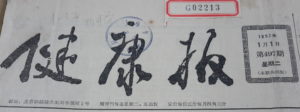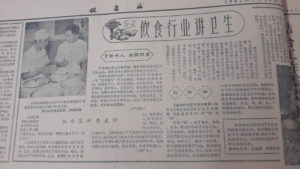Jiankangbao 健康报 (since 1931)
Jiankangbao 健康报 (since 1931)
Issued by the Weishengbu 卫生部
The Jiankangbao (JKB) is an official mouthpiece of the Weishengbu, the ministry of health, and thus the CCP, featuring official directives, announcements and articles formerly published in the Renmin ribao 人民日报 (RMRB) as well as articles on hygiene, health and medical topics.
Though called Jiankangbao, the newspaper – appearing up to two or three times a week – does not necessarily hold for defining the term jiankang 健康. First and foremost it served as a mostly four-paged bulletin board for government directives and announcements. Most of these directives, not only in the beginning of the PRC but especially in the end of the Maoist era, did influence hygiene work and medical work to some extent, but not necessarily. Especially during the later years of the Maoist era an increasing amount of articles and texts are reproductions of Mao’s speeches and distinctly flavored articles from the RMRB.
When looking at the part of the JKB that is not so much concerned with the political and ideological development of the PRC, one is left with two kinds of texts:
- detailed reports about hygiene improvement and medical development (admittedly influenced by the desire to depict the nation’s development)
- cursory articles on health and disease, tipps and advice
In the 1950s, articles of the last category are, more often than not, translations from Russian, discussing not only the Soviet health system and services, but also scientific discoveries. Some are written on a solid foundation of Russian literature. Most of the larger articles are serialized, appearing in three, four or sometimes five adjoining papers. Also, topics tend to be discussed in more than one issue, giving a wider platform for a more thorough approach to the matters at hand.
A distinct pattern can be made out in the topics discussed in the last two categories. For the 1950s a number of articles and reports are published on the issue of infectious diseases such as schistosomiasis [1], vaccinations and hygiene improvements to curtail the spreading of said diseases. In later issues the main topics change recognizably to food hygiene, including the question of food storage and the improvement of hygiene standards in public canteens. During 1957 the topic of family planning and contraception is discussed at length, and in 1958 the widespread movement to build a New Medicine is emphasized frequently.
The Great Leap Forward also leaves its mark on the articles in the JKB. Food shortages are, of course, not mentioned but the issue of food poisoning and food hygiene comes up more frequently from 1960 on. Articles on metabolic issues and other food and nutrition related topics are published more frequently than in 1956 for example.
In the first year of the Cultural Revolution the JKB follows the mainstream of the RMRB and the Hongqi 红旗 and issues close to no articles concerning health or hygiene in any way, succumbing to the ideological need to spread propaganda and more visual material in form of photographs. Still, the use of the word jiankang 健康 appears to increase during that time as opposed to earlier issues of the newspaper, where it almost never makes an appearance.
Throughout the JKB the human body is labelled as a battlefield that has to be secured and defended by medicine, while the mind has to be protected by correct ideology. Falling into line with the assumption that the body is a means of production for the individual as well as for the state, this denotes the quest for health as a quest for successful production and strengthening of the nation.
In the end, the JKB proved to be a valid organ to pursue the official Party line in health matters and beyond, and also insightful as to how issues in health and hygiene policies have changed. From a focus on infectious diseases, to concerns about food hygiene in public canteens, to contraception, the most pressing public health issues at the time are discussed and made available to the public on a weekly basis.
[1] Miriam Gross and Kawai Fan (2014): „Schistosomiasis“ In: Andrews, Bridie and Brown Bullock, Mary (2014): Medical Transitions in Twentieth-Century China. Indiana: Indiana University Press.
Renée Krusche

